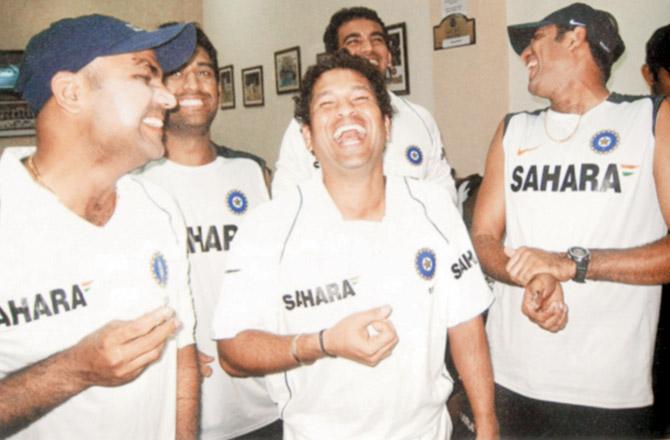In his new book, the Indian cricket team's former mental conditioning coach, Paddy Upton, gives readers a no-holds-barred insight into what the sport has taught him about life and people in general

Paddy Upton
Cricket can seem like a tedious game. You don't just play it for days. You play it for seasons. Winter in India. Summer in England. "But it's also a multi-dimensional profession, like all other sports," sports and performance psychologist Shree Advani tells us, explaining that it takes a lot out of a person at a mental, physical, emotional and spiritual level. Many of the lessons that players pick up on the way, however, can also apply to individuals in other careers. Those insights are now in the public domain in the form of The Barefoot Coach (Westland), a book that Paddy Upton — mental conditioning coach of India's World Cup winning national team of 2011, and head coach of Rajasthan Royals — has written. We pick five of his key revelations from the title so that you, too, can gain from his experience, no matter what field of work you belong to.
ADVERTISEMENT
1. Keep your ego in check
Upton comes clean about the biggest professional mistake in his life to illustrate how a person's ego sits like a monkey on his shoulder. He had let the comparatively greater media attention that head coach and fellow South African Gary Kirsten had been receiving, get to him, after the Indian team started performing better and better around 2009. So, "to set the record straight" as he says, he leaked a certain document that he had prepared for the Indian team to a journalist he trusted, hoping to get some positive press for himself. What happened instead is that this scribe misconstrued Upton's advice to the team about the importance of having a healthy sex life, and attributed it all to Kirsten, bringing him disrepute since the article was painted in a negative light. Upton writes, "I had acted out of self-interest, out of ego, in order to get recognition for myself. What I had succeeded in doing was to hurt one of the persons in this world whom I least wanted to hurt."

Paddy Upton and Gary Kirsten. Pics courtesy/Paddy Upton
2. Start from scratch
It can be easy to get caught up in the warm glow of success after a high in your career. Instead, it's a better idea to start from scratch straight away and focus on the next goal. Upton talks about tennis champion Rafael Nadal's concept of "getting back to zero". The idea is to treat winning a tournament as plus-five, and losing in the first round as minus-three. Either way, you have to get back to zero and reset the mind and body for whatever the next challenge might be. The Indian national cricket team, for instance, failed to do that after the incredible rush of winning the World Cup in 2011. They spent too long on the top of the mountain, metaphorically speaking, and thus tumbled soon after to suffer a string of defeats.

The Indian team after winning the 2011 World Cup, a success in which they basked for too long
3. Be the right alpha leader
Most leaders by nature are alpha persons. They have a sense of dynamism that puts them at the head of the herd. But this strong personality can assert itself in a negative manner sometimes. In the corporate world, that would be the definition of a bad boss. This person would treat his employees merely as resources who help him achieve his own selfish ends. As a result, his subordinates would go into survival mode and fail to work as a unit, which — in cricket — would translate into a batsman looking to stay at the crease at the cost of sacrificing his wicket for the greater good of the team. Healthy alpha leaders, on the other hand, would place high demands on juniors, but the latter would experience that as being fair. That's because this leader also embodies the crucial quality of empathy, since he is willing to listen to others and is sensitive to what they might be going through. Upton cites Graeme Smith as an example, under whose exemplary captaincy the South African side was a happy cricket team.

(From left) A happy frame of Indian cricket greats Virender Sehwag, Mahendra Singh Dhoni, Sachin Tendulkar and VVS Laxman
4. Let the feeling of failure go
It might seem like a clichéd phrase, but "this too shall pass" is an effective way of dealing with failure. Upton writes about a certain chat that he'd had with Kyle Mills, after the New Zealand cricket team had suffered a string of seven consecutive defeats, four of which were against cricketing minnows Bangladesh. The fast bowler's energy had been so morbid when he had been shaking hands with Upton at the end of their latest defeat, against India, that the Indian mental conditioning coach felt compelled to have a quick chat with him later on, even though he came from the opposing team. Upton told Mills that cricket is just a game, and for that matter, so is life. He told him, "Take yourself one year ahead of today, and tell me what you would say about this experience." Mills initially looked confused as "he tried to extract himself from the moment and project into the future". But after a few moments, he realised that the losses wouldn't feel as bad later on, and that he might even gain some valuable lessons from the experience. "This too shall pass," Mills understood.
Quick singles with the barefoot coach
How best can a person in a high-profile job put blinkers on to ward off the constant attention they have to deal with?
It's difficult for high-profile celebrities to separate their three lives — personal, public and professional. Some get too caught up in the public lives, basking in the glory of the limelight. These individuals run the risk of compromising their professional life, and if they fall into the easy trap of merging their personal and public lives, it could leave them vulnerable to post-career difficulties and even depression. Those who do best place their personal and professional lives as the priority, and avoid all the traps and attractions of living the public life as a celebrity. In this way, they maintain their professional processes of training, preparation and sleep. Players like Rahul Dravid and VVS Laxman are excellent examples of this.
How would you say that the impact of playing a sport like cricket professionally affects the way a teenager evolves into a person in his mid-thirties?
An athlete who goes into professional sports at a young age, and remains there for say two decades, will have varying degrees of ease or difficulty when exiting the career and returning to 'normal' life. This will be dependent on the degree to which they remain with their feet on the ground versus adopting the values and expectations that fans and the society places on them. The ideal way is for them to work on advancing their professional life as much as they work on being a good human being, of sound personal values. They should ideally not attach their personal identity to the talent they have, and the results that flow from it.
What are some ways for players to deal with the separation anxiety of being away from their families on lengthy tours?
Being on tour looks amazing from the outside, but from personal experience, living for long periods in a hotel room can be very lonely, even for the most celebrated public figures. What's important is that players have a strong connection to something important in their personal lives, and away from the game. It's probably best to have good friends and family relationships [or hobbies], where cricket is not the main focus of conversation or attention. Many players spend their hours on PlayStation or on social media. This temporarily hides the experience of loneliness, but does very little to overcome it when they walk away from that temporary distraction.
Catch up on all the latest Mumbai news, crime news, current affairs, and also a complete guide on Mumbai from food to things to do and events across the city here. Also download the new mid-day Android and iOS apps to get latest updates
 Subscribe today by clicking the link and stay updated with the latest news!" Click here!
Subscribe today by clicking the link and stay updated with the latest news!" Click here!







